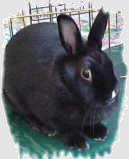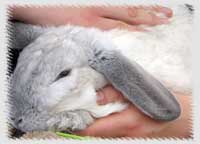
The National House Rabbit Society site also has tips on finding a home for a rabbit you want to rehome.
Finding a Home for an Unwanted Rabbit
House Rabbit Society foster volunteers bring abandoned rabbits into their own homes until permanent homes can be found. Because of the overwhelming number of unwanted rabbits, we are only able to take in rabbits scheduled to be destroyed at animal shelters. Even then we can only save a few.
Your best hope is to house the rabbit yourself (or board her) and advertise until you find the right home. Advertising is as simple as placing ads in local newspapers and on veterinarian, pet supply store and supermarket bulletin boards. It is possible to find good homes for rabbits, but it takes time, commitment and strategy.
There are two steps to finding homes for rabbits. The first is to prepare the rabbit for adoption. This includes spaying or neutering, litter box training, socializing, and learning bunny's health status and personality. The second step is to aggressively seek an ideal home by advertising and screening callers for suitability.
Spaying or neutering makes a rabbit calmer and easier to litter box train, and thus improves the chance of being adopted as an indoor companion. It also insures that no more unwanted rabbits will be produced after the rabbit leaves your home.
Litter box training is achieved by fastening a litter box to the side of the cage in the corner the rabbit uses as a bathroom. Once bunny is using the box, try him in a safe, bunny-proofed room with one or more litter boxes. ("bunny-proofed" means a place where items that rabbits find tempting to chew, such as house plants and telephone and electrical cords, have been placed out of reach.) In a matter of days a neutered rabbit can be advertised as "house-trained."
The more attention you give your bunny, the more she will show off for prospective adopters. Petting the rabbit (most prefer the top of the head) will teach her to look for affection from humans. Follow up on any health problems with a trip to the vet, so you can tell the new owner what to expect.
When placing ads, state your rabbit's strong points: "neutered," "house-trained," "affectionate," "friendly." Asking a $15-$20 fee in the ad excludes callers wanting a free meal for their pet reptiles. People willing to commit to owning a rabbit will gladly pay an adoption fee.
To screen people who answer your ad, imagine what kind of home you want for your rabbit, and then stick to your ideal. Engage the caller in a conversation about their past pets to find out what they're looking for in a pet. Explain that you are asking questions because you want the new owner and the rabbit to be happy. Present a realistic picture of what rabbits are like. If you feel the home is not suitable, make an excuse. Politely tell the caller that your rabbit doesn't do well with children, isn't used to hutch-living, is scared of dogs, or whatever.
At House Rabbit Society, we look for indoor homes for our rabbits, so that they will enjoy lives that are both safe and social. The rabbit has a cage, but is allowed some supervised freedom daily. How soon a rabbit becomes an uncaged roommate depends on how bunny-proofed the home is and on the maturity and personality of the rabbit. The more involved the owner is, the more freedom the rabbit will be given. Another House Rabbit Society criteria is that an adult, not a child, be the rabbit's primary care-giver. Good luck placing your rabbit.
Remember that even if you don't think you are giving your rabbit the attention she deserves, it is better than placing her in a shelter where her chances of long-term survival are not guaranteed.
Turning Rabbits Loose
Domestic rabbits are not the products of natural selection, which means that only the fittest, fastest, and smartest of a species survives to reproduce. Domestic rabbits are a by-product of human interference by means of breeding programs, and the result is a human-dependent animal who needs protection.
When a domestic rabbit is turned out in a field or a park to "fend for itself," it is totally unprepared to do so. Domestic rabbits are the products of generation after generation of rabbits kept in confinement and entirely dependent on their keepers for food, water, and safety.
Before you release a domestic rabbit into the wild, consider the following:
- Domestic rabbits were raised in confinement, as were generations of rabbits before them. This makes it extremely difficult for the rabbit to know what is dangerous to it in the wild. Not only does the domestic rabbit lack experience in determining what is a threat, but he had no opportunity to learn from his parents, who were also confined.
- There are a lot of cats, dogs, foxes, and other predators out there who have had much better training from their parents on how to be a predator than the domestic rabbit has had on surviving in the wild.
- Many domestic rabbits are light-colored, which makes it difficult to hide from predators. Domestic rabbits have also adapted to a captive schedule of living and feeding, rather than following the natural cycle of wild rabbits, who feed primarily from dusk to dawn.
- The domestic rabbit you release in your neighborhood may survive for a short time, but she will eventually fall prey to cats, dogs, traffic, or other injury and/or disease, and may experience considerable suffering in the process. If you can no longer keep your rabbit, please choose the humane alternative and try to find your rabbit a safe indoor home.
The national headquarters has several compelling informational posters about the dangers of setting your rabbit loose:
You can post an ad on Petfinder.com (see our link below) to rehome your rabbit. SHRS it totally independent from Petfinder.

